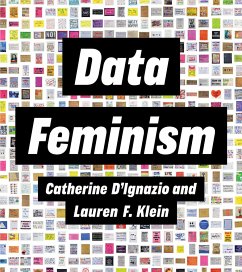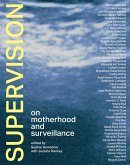"We have seen through many examples that data science and artificial intelligence can reinforce structural inequalities like sexism and racism. Data is power, and that power is distributed unequally. This book offers a vision for a feminist data science that can challenge power and work towards justice. This book takes a stand against a world that benefits some (including the authors, two white women) at the expense of others. It seeks to provide concrete steps for data scientists seeking to learn how feminism can help them work towards justice, and for feminists seeking to learn how their own work can carry over to the growing field of data science. It is addressed to professionals in all fields where data-driven decisions are being made, as well as to communities that want to better understand the data that surrounds them. It is written for everyone who seeks to better understand the charts and statistics that they encounter in their day-to-day lives, and for everyone who seeks to better communicate the significance of such charts and statistics to others. This is an example-driven book written with a broad audience of scholars, students, and practitioners in mind. It offers a way of thinking about data, both their uses and their limits, that is informed by direct experience, by a commitment to action, and by the ideas associated with intersectional feminist thought"--
Without ever finger-wagging, Data Feminism reveals inequities and offers a way out of a broken system in which the numbers are allowed to lie.
WIRED
"Anyone who works with data and all scientists do, of course will benefit from reading this book. But the readers who may gain the most from it are those who are trying to use data in the public interest. Data Feminism does such a good job of integrating theories and projects across several fields that it will likely become a touchstone for teaching data science that goes beyond data ethics."
American Scientist
...the authors' demystification of data science and advocacy for data feminism are extremely timely. The book also serves as an important introduction to intersectional feminist practice by providing inspiring examples of marginalized women and communities taking power back by collecting and wielding counter-data to challenge the status quo.
Times Higher Education
"This call to action is especially important as issues of power and privilege continue to re-create inequalities in contemporary society."
CHOICE
Data Feminism is a powerful call to action for everyone who cares about how technology reflects and reproduces social hierarchies and injustices. Brilliantly argued, engagingly written, and collaboratively crafted, this groundbreaking work enacts a feminist politics of knowledge production that will serve as a guide for generations to come.
Ruha Benjamin, Princeton University; author of Race after Technology
Data Feminism is an exceptional and entertaining primer for data scientists to understand essential ethical concepts like power, inequality, gender, and race.
DJ Patil, Head of Technology at Devoted Health, Inc., Former U.S. Chief Data Scientist
If you want to build a foundation in data ethics and data justice, Data Feminism is a must-read. D'Ignazio and Klein have written a remarkable book that defines the kind of critical, intersectional feminist thinking we need right now. I can think of no better entry point to understand digital technology and its impact on society than Data Feminism, which amplifies so many important ideas we need to act upon. This book is a major contribution in defining what biased and harmful data is, and more importantly, what we can do about it.
Safiya Umoja Noble, UCLA; author of Algorithms of Oppression: How Search Engines Reinforce Racism and coeditor of The Intersectional Internet: Race, Sex, Class and Culture Online
Most thinking about data science and data visualization tends to focus on statistics and technique. D'Ignazio and Klein take us out of that daze, opening our eyes to the realities that lie behind every data set: its motivation, its biases, and its existence in a harshly unequal world. Required reading for data scientists looking to conduct their craft responsibly.
Fernanda Viégas. Senior Researcher, co-leader at People + AI Research, Google
Data Feminism belongs on the shelf with Algorithms of Oppression as required reading for understanding historical patterns of oppression and society s current obsession with data-driven decision making.
RGWS: A Feminist Review
WIRED
"Anyone who works with data and all scientists do, of course will benefit from reading this book. But the readers who may gain the most from it are those who are trying to use data in the public interest. Data Feminism does such a good job of integrating theories and projects across several fields that it will likely become a touchstone for teaching data science that goes beyond data ethics."
American Scientist
...the authors' demystification of data science and advocacy for data feminism are extremely timely. The book also serves as an important introduction to intersectional feminist practice by providing inspiring examples of marginalized women and communities taking power back by collecting and wielding counter-data to challenge the status quo.
Times Higher Education
"This call to action is especially important as issues of power and privilege continue to re-create inequalities in contemporary society."
CHOICE
Data Feminism is a powerful call to action for everyone who cares about how technology reflects and reproduces social hierarchies and injustices. Brilliantly argued, engagingly written, and collaboratively crafted, this groundbreaking work enacts a feminist politics of knowledge production that will serve as a guide for generations to come.
Ruha Benjamin, Princeton University; author of Race after Technology
Data Feminism is an exceptional and entertaining primer for data scientists to understand essential ethical concepts like power, inequality, gender, and race.
DJ Patil, Head of Technology at Devoted Health, Inc., Former U.S. Chief Data Scientist
If you want to build a foundation in data ethics and data justice, Data Feminism is a must-read. D'Ignazio and Klein have written a remarkable book that defines the kind of critical, intersectional feminist thinking we need right now. I can think of no better entry point to understand digital technology and its impact on society than Data Feminism, which amplifies so many important ideas we need to act upon. This book is a major contribution in defining what biased and harmful data is, and more importantly, what we can do about it.
Safiya Umoja Noble, UCLA; author of Algorithms of Oppression: How Search Engines Reinforce Racism and coeditor of The Intersectional Internet: Race, Sex, Class and Culture Online
Most thinking about data science and data visualization tends to focus on statistics and technique. D'Ignazio and Klein take us out of that daze, opening our eyes to the realities that lie behind every data set: its motivation, its biases, and its existence in a harshly unequal world. Required reading for data scientists looking to conduct their craft responsibly.
Fernanda Viégas. Senior Researcher, co-leader at People + AI Research, Google
Data Feminism belongs on the shelf with Algorithms of Oppression as required reading for understanding historical patterns of oppression and society s current obsession with data-driven decision making.
RGWS: A Feminist Review








